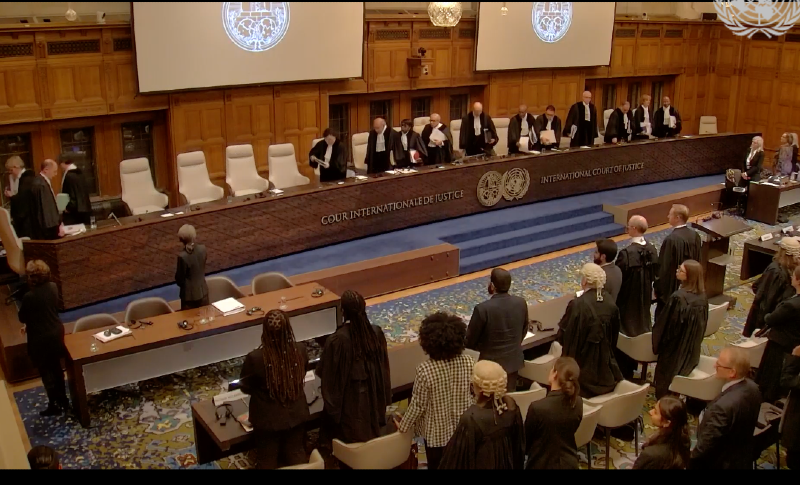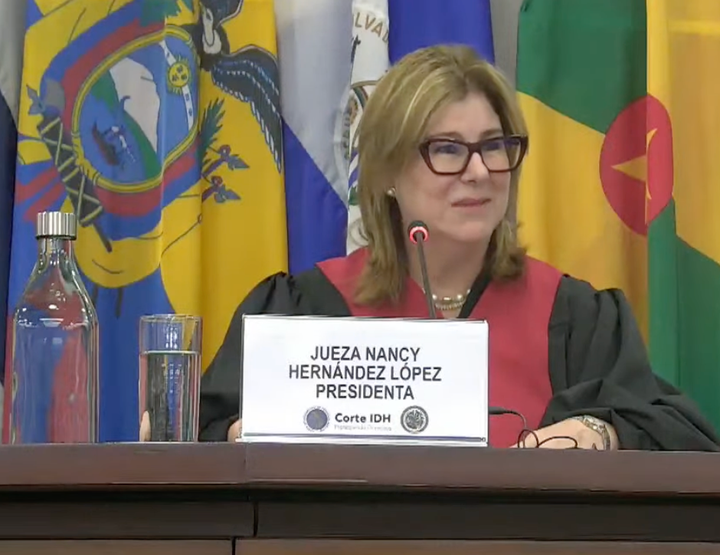Climate Crisis "Threatens Our Very Existence," Small Island States Tell World Court

Vanuatu, Melanesia, Bahamas, Bangladesh, and others testify as historic climate justice hearings begin at the International Court of Justice.
Article co-published with One Earth Now
Today the world’s highest court and the judicial body of the United Nations opened a historic two-week oral proceeding on climate justice. The hearings currently underway at the International Court of Justice in The Hague, Netherlands are part of the process of the court’s development of an advisory opinion on states’ responsibilities under international law to prevent climate change harm and the legal consequences for failing to fulfill these duties. It is, in short, an unprecedented legal case addressing what many recognize as the greatest challenge of our time – the global climate emergency. And for small island developing states and other nations on the frontlines of this emergency, their very survival is literally on the line.
“We find ourselves on the frontlines of a crisis we did not create, a crisis that threatens our very existence,” Vanuatu’s special envoy for climate change and environment Ralph Regenvanu told the court in his opening statement. Underscoring the gravity of the situation and the significance of pursuing justice through these proceedings, he said: “This may well be the most consequential case in the history of humanity.”
Vanuatu and a handful of other similarly situated small island and most climate-vulnerable nations delivered powerful testimony on the opening day of the ICJ climate hearings that spoke to their existential peril and frustration with ongoing UN climate negotiations as well as their demands for accountability from high-emitting countries most responsible for the climate change problem.
“The time for empty promises has passed,” a representative for Bangladesh told the court. The current UN framework governing international climate negotiations is grossly insufficient for halting dangerous global heating and protecting the most vulnerable countries, these states say.
Speaking at a media briefing on Monday from the courthouse steps, Regenvanu said Vanuatu and other small island states have been “continually frustrated” by the UN Framework Convention on Climate Change (UNFCCC) process that has played out over the last 30 years. “Coming to the International Court of Justice, we are trying to find another way to get climate action that we need…that science says we need, but which so many countries through the power of political convenience and the fossil fuel lobby refuse to take action on,” he said.
Regenvanu and several others who testified reminded the court that the climate change problem has been known by powerful countries like the US since at least the 1960s, referencing a 1965 warning from former president Lyndon Johnson, for example, that recognized “a steady increase in carbon dioxide through the burning of fossil fuels.”
Fossil fuels are the problem
The continued production and consumption of fossil fuels – oil, coal, and gas – despite clear understanding of the catastrophic climate consequences, is at the heart of the problem, Pacific Island communities argued.
Professor Jorge Vinuales, speaking on behalf of Vanuatu and the Melanesian Spearhead Group, noted that the International Energy Agency has said that realizing net-zero greenhouse gas (GHG) emissions by 2050 means no new fossil fuel development (starting in 2021). Yet the fossil fuel production plans of countries seemingly ignore that warning and would result in a level of emissions inconsistent with the goals of the Paris Agreement for limiting global temperature rise. “Large producing states are proactively expanding their fossil fuel production and consumption, playing lip service to their climate commitments,” Vinuales told the court. He pointed out that fossil fuel subsidies from governments reached an all-time high of $7 trillion in 2022. “For decades, what we have seen from large-emitting and producing states is delay, low ambition, and in practice concrete plans to expand extraction and use of fossil fuels,” he argued.
Such conduct, Vanuatu and other small islands states say, amounts to violations of international law.
“How can the conduct that has taken humanity to the brink of catastrophe, threatening the survival of entire peoples, be lawful and without consequences?” Vanuatu Attorney General Arnold Kiel Loughman asked the court.
He testified that the rights enshrined in Vanuatu’s constitution are being undermined by the conduct of other countries, and that all countries have legal obligations to prevent significant harm to other nations, to respect human rights and protect the right to self-determination, and to act with due diligence. “The failure by a small number of large emitting states to fulfill these obligations constitutes an internationally wrongful act, triggering legal consequences under international law of state responsibility,” Loughman said.
Margaretha Wewerinke-Singh, an international lawyer with Blue Ocean Law and counsel for Vanuatu in this proceeding, explained that the customary law of state responsibility requires that states cease their wrongful conduct. In the context of climate change, that entails actions like implementing regulatory measures to ensure deep emissions cuts and curtailing fossil fuel expansion and subsidies. It also means that responsible states “make full reparations” for their damaging behavior. She pointed to the example of the US state of Vermont that enacted a world-first climate superfund law earlier this year. While that law holds major oil and gas companies, not governments, liable for paying for climate pollution, Wewerinke-Singh said it demonstrates “that holding specific polluters accountable for climate damages is not only possible in theory, but achievable in practice.”
But whether large polluting countries can actually be held accountable, and whether their legal obligations to prevent climate harm extend beyond the UNFCCC and its associated climate treaties, remain key points of contention in this landmark case.
Standing in stark contrast to the positions of Vanuatu, Bangladesh, and other most-climate-vulnerable states, the petrostate of Saudi Arabia argued against liability for climate harm and insisted that countries’ legal obligations must be limited to what it called the ‘specialized climate change treaty regime,’ which includes the UNFCCC, the Kyoto Protocol, and the Paris Agreement. Despite having, as Climate Action Tracker puts it, “a track record of obstructing international climate negotiations,” Saudi Arabia told the court that these negotiations are the only viable solution and that an advisory opinion “cannot be a substitute” for this process. Saudi Arabia also argued that scientists have no role in informing legal obligations and that there is no basis for the court to recommend limits on fossil fuel extraction.
“My country will cease to exist”
Small island states pushed back and called out (though not by name) big polluters like Saudi Arabia. As one representative for Barbados said, many major emitting states “knew that all of our lives would become shorter, more brutish, and more vulnerable because of their decisions to promote fossil fuels.” And as L. Ryan Pinder, attorney general for the Bahamas, told the court: “It is time for these polluters to pay.”
“The devastation is undeniable,” Pinder said. “If we continue on our current path, my country will cease to exist.” His testimony explained climate change is already starting to ruin the Bahamas, from monstrous hurricanes to warming oceans and coral bleaching to rising sea levels. The vast majority of the country’s land, 80%, sits just 1.5 meters above sea level, and by the end of this century all its iconic sandy beaches could be gone. “The Bahamas is at risk of becoming uninhabitable,” he said.
Several other Caribbean states shared similar warnings of their dire circumstances. Kerrie Symmonds, a foreign minister for Barbados, said the climate crisis “is for us an imminent matter of life and death.” Gaston Browne of Antigua and Barbuda said the matter before the court “is not just a legal question. It is a matter of survival.”
Julian Aguon, a lawyer with Blue Ocean Law who testified on behalf of Vanuatu and the Melanesian Spearhead Group, explained that rising sea levels are “projected to submerge the entire territory of certain small island states, possibly within decades.” Conduct resulting in some states being wiped off the map, Aguon argued, clearly violates the fundamental legal principle of self-determination. “The conduct of a handful of states has caused severe, systemic and sustained violations of this right.”
“This is a case about our identity as Pacific Islanders, our human rights as citizens of this planet,” Regenvanu told reporters at Monday’s media briefing.
The court is expected to hear from 110 parties in total, and the hearings will continue Tuesday and the rest of this week and will wrap up at the end of next week on December 13. The court’s advisory opinion could come later in 2025. The full hearing schedule is here, and a live-stream is available on UN web TV and on the court’s website.


